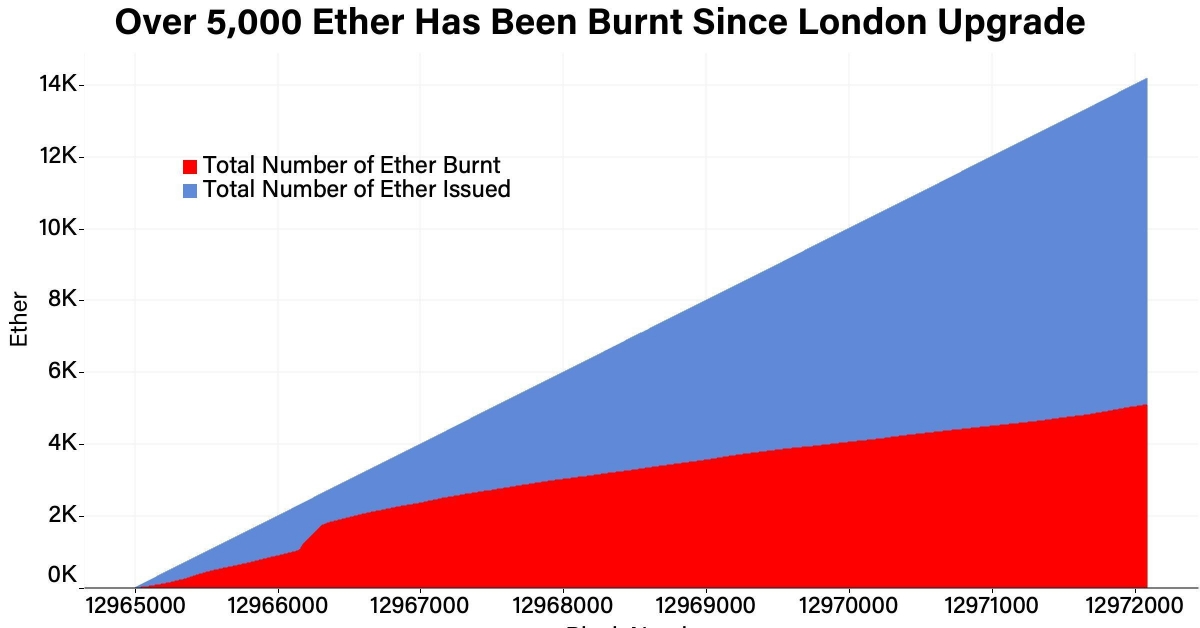 Since the activation of Ethereum Improvement Proposal (EIP) 1559 , the network has removed from circulation, or “burned,” over 5,000 ETH , worth roughly $14 million.This represents 36% of total new coin issuance over the same time period.
Since the activation of Ethereum Improvement Proposal (EIP) 1559 , the network has removed from circulation, or “burned,” over 5,000 ETH , worth roughly $14 million.This represents 36% of total new coin issuance over the same time period.
ETH burned versus ETH issued Source: Dune Analytics Average fees on Ethereum have increased slightly since the upgrade went live on Thursday at 12:33 (UTC), rising from 0.003 ETH to 0.005 ETH.In addition block sizes, measured on Ethereum in units of gas, have been trending as anticipated toward the block gas target of 15 million gas.
At first glance, EIP 1559 seems to be working effectively, burning fees and pricing block space on Ethereum dynamically so that block sizes on average hit a healthy target.However, upon closer examination, there is evidence that EIP 1559 may not be so effective in its main aim to make fees on the network more predictable for users.
Read more: What Crypto Analysts Are Saying About the Ethereum Hard Fork Block size variation Under EIP 1559, blocks being mined on Ethereum oscillate dramatically from being 100% full to empty.
The reason for this, according to Tim Beiko, thechair of the bi-weekly All Core Developers meeting, is because the pool of transactions eligible to be included in a block gets smaller and larger depending on the minimum fee, or “base fee,” decided by the network.
“Say you have a block that raises the base fee because it’s full,” said Beiko in an interview with CoinDesk.“It’s possible that by the time the next block shows up, there’s just not been that many new transactions who are willing to pay this higher price.”
Block Gas Usage on Ethereum Source: Dune Analytics Pseudonymous Ethereum user “Face Shaver” called this a “misalignment of incentives” that can lead to a number of problems, first and foremost being a lack of fee predictability and stability for the average user.
“It’s not that easy for the average user to predict what the fee will be for the next one or two minutes,” said Shaver in an interview with CoinDesk.
“If you are [trying] to get in, either in this block or the next block, the most [fee] volatility you face is ⅛ of the current base fee, but if you think of the average user as someone who is price sensitive, and so is willing to wait one, or even something like three minutes for their transaction to go through … then you have to consider what happens to the fee in next three minutes.”
Read more: Ethereum’s Hotly Anticipated ‘London’ Hard Fork Is Now Live Anticipating what the optimal transaction fee on Ethereum will be in three minutes or more is just as difficult with EIP 1559 as it was before EIP 1559, according to Shaver and Beiko.EIP 1559 helps price transactions for users in the moment, but it does not help users predict or anticipate what fees will be in the next moment because the supply and demand dynamics for block space fluctuate with each block.
According to Beiko, such oscillations impacting block sizes and base fees were always expected from EIP 1559.However, Beiko argues the average user can still benefit from knowing the optimized base fee of sending a transaction on Ethereum in the moment, without having to guess or anticipate fees of future blocks.
Incentivizing volatility and Ethereum burns Savvy users will be careful not to spend more in fees than absolutely necessary..